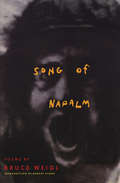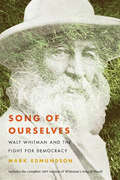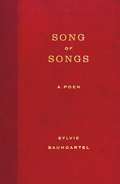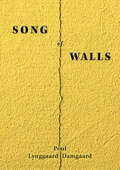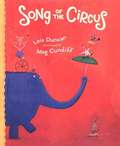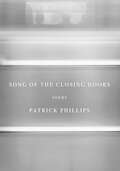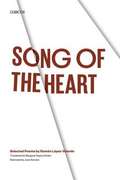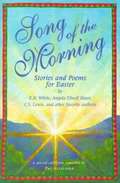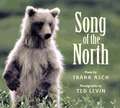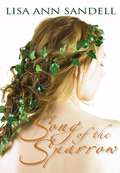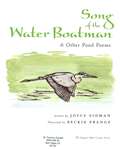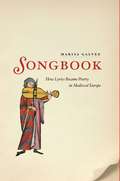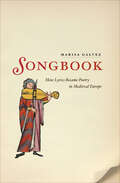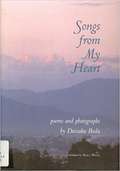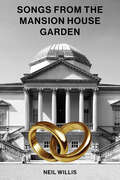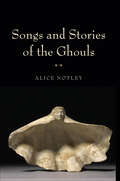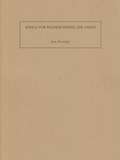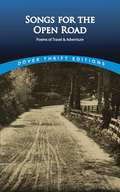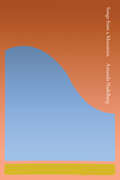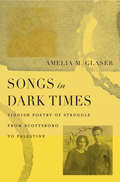- Table View
- List View
Song of Napalm: Poems
by Robert Stone Bruce WeiglSong of Napalm is more than a collection of beautifully wrought, heart-wrenching and often very funny poems. It’s a narrative, the story of an American’s innocent’s descent into hell and his excruciating return to life on the surface. Weigl may have written the best novel so far about the Vietnam War, and along the way a dozen truly memorable poems.” Russell Banks
Song of Ourselves: Walt Whitman and the Fight for Democracy
by Mark EdmundsonIn the midst of a crisis of democracy, we have much to learn from Walt Whitman’s journey toward egalitarian selfhood. Walt Whitman knew a great deal about democracy that we don’t. Most of that knowledge is concentrated in one stunning poem, Song of Myself. Esteemed cultural and literary thinker Mark Edmundson offers a bold reading of the 1855 poem, included here in its entirety. He finds in the poem the genesis and development of a democratic spirit, for the individual and the nation. Whitman broke from past literature that he saw as “feudal”: obsessed with the noble and great. He wanted instead to celebrate the common and everyday. Song of Myself does this, setting the terms for democratic identity and culture in America. The work captures the drama of becoming an egalitarian individual, as the poet ascends to knowledge and happiness by confronting and overcoming the major obstacles to democratic selfhood. In the course of his journey, the poet addresses God and Jesus, body and soul, the love of kings, the fear of the poor, and the fear of death. The poet’s consciousness enlarges; he can see more, comprehend more, and he has more to teach. In Edmundson’s account, Whitman’s great poem does not end with its last line. Seven years after the poem was published, Whitman went to work in hospitals, where he attended to the Civil War’s wounded, sick, and dying. He thus became in life the democratic individual he had prophesied in art. Even now, that prophecy gives us words, thoughts, and feelings to feed the democratic spirit of self and nation.
Song of Songs: A Poem
by Sylvie BaumgartelA debut poetry collection from a writer whose vivid verse explores the connections and relationships that make us humanSometimes I like to feel sexy. Sometimes I don’t. Sometimes I like to be very plain. Invisible almost, hiding in plain sight. I want to hide and to be found. In the spirit of the biblical Song of Solomon, Sylvie Baumgartel’s Song of Songs takes the subjects of love and worship, and brings them to the desperate, wild spaces of domestic life. With a voice at once precise and oneiric, Baumgartel explores the landscapes of sex and desire, power and submission, in this groundbreaking book-length poem that forces us to question the bounds of devotion. An ambitious and vivid debut, Song of Songs is a work of breathtaking honesty, couched in language few of us are brave enough to speak aloud.
Song of Walls
by Poul Lynggaard DamgaardThe poetry collection Song of Walls by Poul Lynggaard Damgaard is a transformation of the poem when it meets the world, and when it meets the world again. The depth of the landscape in touch with the reeds. ‘The courage of the junction” is a poem published in The Long‑Islander, New York, 2018. The beauty of nature is a point of reference. Digtsamlingen Song of Walls af Poul Lynggaard Damgaard er en forvandling af digtet, når det møder verden, og når det igen møder verden. Landskabets dybde i berøring med sivene. ‘The courage of the junction’ er et digt udgivet i The Long Islander, New York, 2018. Naturens skønhed er et referencepunkt.
Song of the Circus
by Lois DuncanGisselda and Bop, true children of the circus stand up to the snarling tiger on the terrible day that the whole performance goes wrong.
Song of the Closing Doors: Poems
by Patrick PhillipsFrom New York City subway encounters to memories of pickup basketball games on Fourth Street, a love letter to the past, and to all the relationships and memories our homeplaces hold, from the National Book Award finalist.&“I will consider a slice of pizza," opens Phillips's poem "Jubilate Civitas." "For rare among pleasures in Gotham, it is both / exquisite and blessedly cheap." Thus, as throughout this collection, he celebrates a simple pleasure that "in a time of deceit . . . is honest and upright, steadfast and good"; even the busted buttons we press when waiting to cross the street make for elegy in a collection that brings us this poet at his burnished best. Phillips finds his love of a complex, vibrant city extends to his dearest people—he writes for his friend Paul, dying of cancer; for his wife&’s stormy eyes when they fight; for the baby boy he once woke at night to feed and change. All these and more pass through Phillips's elegant yet colloquial lines, in a book that shines with love and honesty on every page. As he writes, "If you're reading this / we were once friends."
Song of the Heart: Selected Poems by Ramon Lopez Velarde
by Ramon Lopez VelardeIn this illustrated volume of poetry, two of Mexico's most prominent artists, poet and painter, join their words and images of animals to create a work of startling insight and beauty.
Song of the Morning: Easter Stories and Poems for Children
by Pat AlexanderHere is a book for the whole family to enjoy this Easter, the year round, and for years to come. The Easter events form the climax to a story that began long before. So this book starts with the creation and spoiling of the world, God's rescue plan and the coming of Jesus. The Bible's stories of Palm Sunday, Good Friday and Easter Day are placed in context.
Song of the North
by Frank Asch Ted LevinBear, Puffin, Moose, and all the other inhabitants of the North know its songs. It sings of clean icy waters for fishing, craggy cliffs for nesting, and smooth ponds for teaching babies to swim. The North embraces a community of creatures living together and sharing its resources.
Song of the Sparrow
by Lisa Ann SandellSince she was a small child, Elaine has been the only woman living in a military camp with hundreds of men. When her mother died, her father took Elaine and her brothers to Arthur's camp, where she regularly mingles with people who are now legends.
Song of the Water Boatman And Other Pond Poems: A Caldecott Honor Award Winner
by Joyce SidmanA collection of poems that provide a look at some of the animals, insects, and plants that are found in ponds, with accompanying information about each.
Songbook: How Lyrics Became Poetry in Medieval Europe
by Marisa GalvezToday we usually think of a book of poems as composed by a poet, rather than assembled or adapted by a network of poets and readers. But the earliest European vernacular poetries challenge these assumptions. Medieval songbooks remind us how lyric poetry was once communally produced and received—a collaboration of artists, performers, live audiences, and readers stretching across languages and societies. The only comparative study of its kind, Songbook treats what poetry was before the emergence of the modern category “poetry”: that is, how vernacular songbooks of the thirteenth to fifteenth centuries shaped our modern understanding of poetry by establishing expectations of what is a poem, what is a poet, and what is lyric poetry itself. Marisa Galvez analyzes the seminal songbooks representing the vernacular traditions of Occitan, Middle High German, and Castilian, and tracks the process by which the songbook emerged from the original performance contexts of oral publication, into a medium for preservation, and, finally, into an established literary object. Galvez reveals that songbooks—in ways that resonate with our modern practice of curated archives and playlists—contain lyric, music, images, and other nonlyric texts selected and ordered to reflect the local values and preferences of their readers. At a time when medievalists are reassessing the historical foundations of their field and especially the national literary canons established in the nineteenth century, a new examination of the songbook’s role in several vernacular traditions is more relevant than ever.
Songbook: How Lyrics Became Poetry in Medieval Europe
by Marisa GalvezHow medieval songbooks were composed in collaboration with the community—and across languages and societies: &“Eloquent…clearly argued.&”—Times Literary Supplement Today we usually think of a book of poems as composed by a poet, rather than assembled or adapted by a network of poets and readers. But the earliest European vernacular poetries challenge these assumptions. Medieval songbooks remind us how lyric poetry was once communally produced and received—a collaboration of artists, performers, live audiences, and readers stretching across languages and societies. The only comparative study of its kind, Songbook treats what poetry was before the emergence of the modern category poetry: that is, how vernacular songbooks of the thirteenth to fifteenth centuries shaped our modern understanding of poetry by establishing expectations of what is a poem, what is a poet, and what is lyric poetry itself. Marisa Galvez analyzes the seminal songbooks representing the vernacular traditions of Occitan, Middle High German, and Castilian, and tracks the process by which the songbook emerged from the original performance contexts of oral publication, into a medium for preservation, and, finally, into an established literary object. Galvez reveals that songbooks—in ways that resonate with our modern practice of curated archives and playlists—contain lyric, music, images, and other nonlyric texts selected and ordered to reflect the local values and preferences of their readers. At a time when medievalists are reassessing the historical foundations of their field and especially the national literary canons established in the nineteenth century, a new examination of the songbook&’s role in several vernacular traditions is more relevant than ever.
Songs
by Derek HendersonThe poems in Derek Henderson's Songs are "translations" of a film cycle of the same name, shot by American filmmaker Stan Brakhage (1933-2003) to document his and his family's life in Colorado in the mid-1960s. Where Brakhage's films provide a subjective visual record of his experience bewildered by the eye, these poems let language bewilder the space a reader enters through the ear. Henderson tenders the visual experience of Brakhage's films-films of the domestic and the wild, the private and political, the local and global-into language that insists on the ultimate incapacity of language-or of image-to fully document the comfort and the violence of intimacy. Songs expresses the ecstasy we so often experience in the company of family, but it just as urgently attests to ecstasy's turbulent threat to family's stability. Like Brakhage's films, Henderson's poems carry across into language and find family in every moment, even the broken ones, all of them abounding in hope.
Songs (Mountain West Poetry Series)
by Derek HendersonMountain West Poetry Series Published by the Center for Literary Publishing at Colorado State University The poems in Derek Henderson’s Songs are “translations” of a film cycle of the same name, shot by American filmmaker Stan Brakhage (1933–2003) to document his and his family’s life in Colorado in the mid-1960s. Where Brakhage’s films provide a subjective visual record of his experience bewildered by the eye, these poems let language bewilder the space a reader enters through the ear. Henderson tenders the visual experience of Brakhage’s films—films of the domestic and the wild, the private and political, the local and global—into language that insists on the ultimate incapacity of language—or of image—to fully document the comfort and the violence of intimacy. Songs expresses the ecstasy we so often experience in the company of family, but it just as urgently attests to ecstasy’s turbulent threat to family’s stability. Like Brakhage’s films, Henderson’s poems carry across into language and find family in every moment, even the broken ones, all of them abounding in hope.
Songs From My Heart: Poems and Photographs
by Daisaku IkedaDaisaku Ikeda, a poet laureate, has produced vast amount of poems. In these poems, readers will find genuine feelings and impressions of the real life of a man “who strives at all times to be an honest human being”. Songs from My Heart is the compilation of Ikeda’s poems in which he expresses reflections and ideas that sprang from his daily whirlwind of activities, in such a straight-forward manner that it can be described as his personal diary. Poems here honor youth, nature and the common people.
Songs From The Mansion House Garden
by Neil WillisThrough the ages we have lived in a split society of the haves and have-nots. Songs From The Mansion House Garden is a poetic look into the lives people lead, some through wealth, others religion or through nature, and how we perceive each other. Each will have an opinion on wealth; whether it is a necessity or a creator of each life.By the end the reader can make their own decision on the author’s thoughts.
Songs and Stories of the Ghouls (Wesleyan Poetry Series)
by Alice NotleyLeft dead after our cultures were broken by triumphant enemies, our stories changed to suit others. We now change them again to suit ourselves. Songs and Stories of the Ghouls purports to give power to the dead—voices to the victims of genocide both ancient and contemporary—and presence to women. Medea did not kill her sons; Dido founds a city, over and over again, the city of the present author's poetry. In these poems the poet asserts that though her art comes from a tradition as broken as Afghanistan's statuary, there is always a culture to pass on to one's children, and one is always involved in doing so. We are the ghouls, the drinkers of the blood-sacs, and we insist that we are alive.
Songs for Relinquishing the Earth
by Jan ZwickySongs for Relinquishing the Earth contains many poems of praise and grief for the imperilled earth drawing frequently on Jan Zwicky’s experience as a musician and philosopher and on the landscapes of the prairies and rural Ontario.
Songs for the Harvester of Dreams
by Duane NiatumDuane Niatum writes poems about Native American life in the Northwest.
Songs for the Open Road: Poems of Travel and Adventure (Dover Thrift Editions Ser.)
by The American Poetry Literacy ProjectCollection of more than 80 poems by 50 American and British masters celebrates travel, adventure and the many real and metaphorical journeys each of us take in the course of our lives. Works by Whitman, Byron, Millay, Sandburg, Service, Bliss Carman, Robert Louis Stevenson, Langston Hughes, Emily Dickinson, Robert Frost, Shelley, Tennyson, Yeats, many others. Includes 2 selections from the Common Core State Standards Initiative: "The New Colossus" and "The Railway Train."
Songs from Dreamland: Original Lullabies
by Lois DuncanAn illustrated collection of lullabies and poems about sleep.
Songs from a Mountain
by Amanda Nadelberg"Amanda Nadelberg's poems . . . are jumping, funny, romantic, and frequently lyrical....which in the immediate reading is almost pure music."--Ken Tucker, Entertainment WeeklyFrom "Matson":So what patent reason is there to doubtthe color of a person's hair, there is sunand timpani. Rubber wood bone silkhemp or ivory I will cut my own in Junebut in May endured the next yesterdayI've already now forgotten what all themen I'll ever know smelled like. Maybedevotion on the beach in the middle ofthe week which is dumbed down withplanets imagining song.
Songs in Dark Times: Yiddish Poetry Of Struggle From Scottsboro To Palestine
by Amelia M. GlaserA probing reading of leftist Jewish poets who, during the interwar period, drew on the trauma of pogroms to depict the suffering of other marginalized peoples.Between the world wars, a generation of Jewish leftist poets reached out to other embattled peoples of the earth—Palestinian Arabs, African Americans, Spanish Republicans—in Yiddish verse. Songs in Dark Times examines the richly layered meanings of this project, grounded in Jewish collective trauma but embracing a global community of the oppressed.The long 1930s, Amelia M. Glaser proposes, gave rise to a genre of internationalist modernism in which tropes of national collective memory were rewritten as the shared experiences of many national groups. The utopian Jews of Songs in Dark Times effectively globalized the pogroms in a bold and sometimes fraught literary move that asserted continuity with anti-Arab violence and black lynching. As communists and fellow travelers, the writers also sought to integrate particular experiences of suffering into a borderless narrative of class struggle. Glaser resurrects their poems from the pages of forgotten Yiddish communist periodicals, particularly the New York–based Morgn Frayhayt (Morning Freedom) and the Soviet literary journal Royte Velt (Red World). Alongside compelling analysis, Glaser includes her own translations of ten poems previously unavailable in English, including Malka Lee’s “God’s Black Lamb,” Moyshe Nadir’s “Closer,” and Esther Shumiatsher’s “At the Border of China.”These poets dreamed of a moment when “we” could mean “we workers” rather than “we Jews.” Songs in Dark Times takes on the beauty and difficulty of that dream, in the minds of Yiddish writers who sought to heal the world by translating pain.
